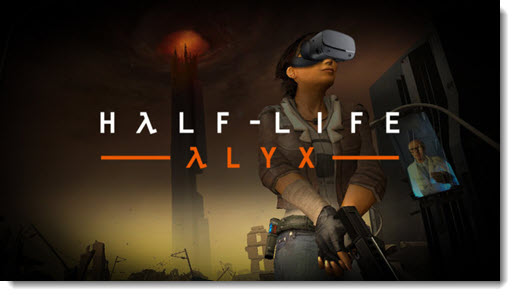
The future of virtual reality may depend on headcrab zombies.
Last week, game developer Valve Corporation made a bombshell announcement: it will release a new VR game, Half-Life: Alyx, in March 2020. The gaming and virtual reality communities are going nuts – gamer forums exploding with excited comments and complaints; nonstop articles in the tech press evaluating the announcement from every angle; emotions ranging from elation to anger; and mostly hope that the game will be good enough to justify all the angst.
Let’s unpack why this is such a big deal.
The tantalizing possibility of a great game
In 1998, Valve Studios released the original Half-Life, a first-person shooter video game for Windows. It won dozens of awards for its graphics, gameplay, and narrative, and is now widely considered to be one of the greatest video games of all time.
Valve released a sequel, Half-Life 2, in 2004. Again, Valve advanced the state of the art in the industry for physics, animation, sound, AI, graphics, and narrative. Reviewers gave it perfect or near-perfect scores, and more than one review called it the best game ever made. Today Half-Life 2 ranks even higher than the original on the list of the greatest video games of all time.
In 2006 and 2007, Valve released two short sequels to Half-Life 2. The second sequel, Half-Life 2: Episode 2, ended in a cliffhanger. The gaming world waited with bated breath for Half-Life 3.
And waited.
And waited.
It’s been 12 long years. During that time, Valve stayed mum, never acknowledging that it was working on anything related to Half-Life but never ruling it out. The absence of Half-Life 3 has become legendary in the gaming industry.

The announcement of Half-Life: Alyx came out of the blue. Valve released a trailer that appears to show actual gameplay. It looks amazing. (Click here if you don’t see the video below.)
Faith in Valve Corporation is high; the hope is that Valve would only decide to release a Half-Life game if it is confident that it will blow everyone away and advance the state of the art. If Valve can manage it, we might be a few months away from playing a truly great game, maybe another one of the best of all time.
But there’s a wrinkle: Half-Life: Alyx is exclusively a VR game. That’s a polarizing choice.
The future of virtual reality
Facebook has poured money into virtual reality. It spent three billion dollars to buy VR headset maker Oculus five years ago based on Mark Zuckerberg’s belief that VR is going to be big and important. This summer, Oculus released two VR headsets – the Oculus Rift S, which is tethered to a powerful gaming PC, and the Oculus Quest, which works independently without a tether. Here’s my summary of the VR market a few months ago.
During Facebook’s earnings call a few weeks ago, Zuckerberg acknowledged that the VR market has taken “longer than expected to materialize.” Facebook is making some money from Oculus hardware sales, but VR continues to be a niche market. Oculus and competitors like the HTC Vive and the expensive Valve Index are selling modestly at best.
After a few months on the market, Oculus announced new technology that will allow owners of the Oculus Quest to play the same AAA titles as the Oculus Rift, using a special cable. The display resolution and gameplay experience will be similar to the Rift S if the cable is attached to a powerful gaming computer.
The most likely scenario is that Oculus introduced the two VR headsets as an experiment to see which one resonated with gamers. The Quest seems to have won. The Rift S may not be withdrawn, but it’s clear that the Quest has all the momentum going forward.
That might help define the market, but it’s still a niche market, and developers are clearly hanging back. A couple of new AAA VR titles have appeared recently (Asgard’s Wrath and Stormland, both quite good), but there is no sense that floodgates are opening.
Half-Life: Alyx has the potential to motivate millions of gamers to invest in VR headsets, single-handedly breathing life into the VR market. In the words of a Verge editor during a roundtable:
“It makes me wonder if perhaps this could be the spark that not only ignites VR, but inflames the passions of a modding community yet again — that a community that’s hungry for more to play on these headsets might just go ahead and build something on top of what Valve does here. . . . I’m no longer asking myself whether I should buy a VR headset, but which headset. If Alyx delivers, my killer app for VR will have finally arrived.”
If Half-Life: Alyx does not kickstart VR to a bigger market, then it’s reasonable to wonder if that is the beginning of the end for VR. TechRadar asks the right question:
“If Alyx doesn’t succeed, what does that mean for the future of VR gaming? Can we declare it dead in the water? Because if a much-awaited new Half-Life outing doesn’t work to persuade folks to invest in a headset, will anything?“
Is this really a play to control VR game distribution?
Back in 2003, the dominance of Half-Life 2 put Valve in a position to launch Steam as a digital distribution service. Steam became the dominant platform for PC gaming, selling billions of dollars of games each year and controlling the vast majority of the PC game market.
Last year Fortnite creator Epic Games launched its own PC game store in an attempt to chip away at Steam’s de facto monopoly. Facebook has its own Oculus store for VR titles, and smaller stores like Discord are trying to break through.

Half-Life: Alyx will exclusively be sold on SteamVR, a platform for VR games that allows VR games to be played on almost all PC VR headsets. You’ll buy Half-Life: Alyx on SteamVR, but you’ll be able to play it on Oculus Rift S, HTC Vive, Valve Index, and several other VR rigs.
Valve undoubtedly hopes to become the de facto storefront for all VR games. A hugely-anticipated game like Half-Life: Alyx will help it become dominant, just as Half-Life 2 helped Steam take over PC games 16 years ago.
You don’t need to worry about that now. The important thing for gamers is to watch for news and reviews of Half-Life: Alyx. (If you’re already convinced, pre-order it from Steam now for 10% off.) Take a close look at the specs for your PC – Half-Life: Alyx will be demanding. And start to think about which VR headset you want to put on your Xmas list.

Half Life series is my one the best story line Series and half life Alyx is also one of them i really like to use Virtual Visual Field VR to play it for more information check them our
Which is the best product among those listed in this site?
https://bestgamingitems.com/best-computer-gaming-headset/
Thanks for this article! Informative and to the point.
Bought Half-Life on day of release and still have the original box…..fantastic game!
Been away from gaming for a long time……more important priorities in life. I’m slowly circling back and have been interested (not purchased yet) in the Oculus Quest due to it being untethered (no cables and no PC) and not complicated with setup.
If HL:Alyx can run on the Quest (even if using a tethered cable), then I may just indulge myself and the time.
John Carmack just said yesterday that he’s got more improvements in mind for the Quest when it’s cabled to a PC. But there’s a catch: the PC might be streaming the game to the Quest, but it has to be a powerful gaming PC in its own right. Specs for Half-Life: Alyx are high – beefy video card, 12Gb of RAM, big processor. If you’ve got the horsepower, then the Quest looks great. If not, the Quest might still be fun, but you’d be limited to the games it supports natively. Have fun!